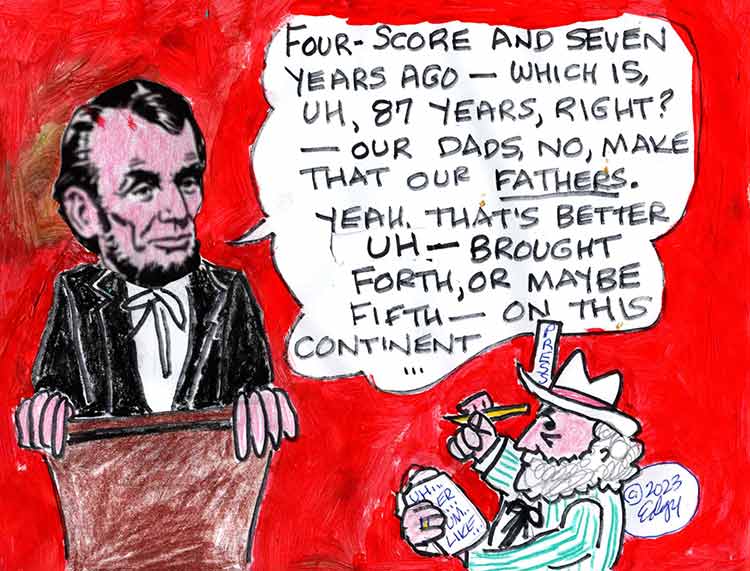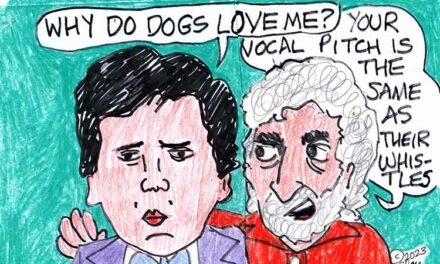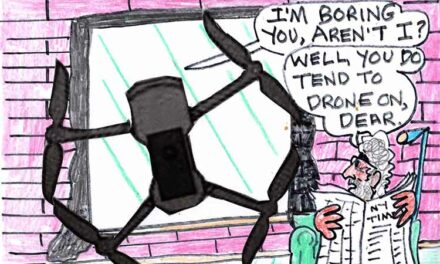Do You Suffer from FPs? Uh, Really?
Are “filled pauses” symptomatic of thought or lack of same?
By Ed Goldman
Today’s medical news is about the epidemic of FPs in our daily lives.
While there’s no known cure as yet, the matter is being studied with diligence by researchers ranging from speech therapists and linguists to, I imagine, impressionists who like to channel business luminaries who are FP sufferers, like Woody Allen, James Stewart and Porky Pig.
The grill is gone
No, this isn’t about stuttering. If it were, I’d have name-dropped President Joe Biden and comedian Bob Newhart. This is about a very human trait called Filled Pauses.
FPs are grunts and emanations such as “uh,” “er,” “doh,” “hmm” and, in sections of Brooklyn, even the sporadic “duh.” They’re not the same as conversation halters which are meant to be bridges—like “Is that right?” and “Well, I’ll be darned!” in polite company and, in my world, “Shut the !$#@ up!” and “No !$#@%&* in’ way, man!”
While the extensive use of FPs has usually been considered a signal of the speaker’s inarticulateness—or worse, a seeming lack of intelligence—science is now starting to side with all of us who use FPs as a matter of survival. And it’s about time it returned the favor. I mean, we’ve spoken well of science for years.
“It takes some time to formulate what we are going to say, and the topics we are talking about are often complex and require specialized vocabulary,” writes Valerie Fridland, a linguistics professor at the University of Nevada, in Reno (suggested cheerleading yell: “Go team! Come on, Hard Eight!”).
“If pauses are just a symptom of increased cognitive load, however, why don’t we pause silently?” Dr. Fridland asks rhetorically in an essay for The Wall Street Journal. “Why fill them with um and uh?”
She continues (without a pause, I might add admiringly): “Some linguistics researchers believe that filled pauses aren’t only related to speech processing tasks but are a communicative strategy. In this line of thinking, we use filled pauses instead of silent ones precisely because we want to convey a message to our conversational partner.”
K. Now, there are certain occasions when you don’t want to hear too many “ers,” “ums” or “dohs.” Like:
- When your surgeon is explaining what’s about to be done to your body politic: “We’re just gonna re-route your, uh, you know, that tube-ish thing-a-ling….”
- When you’re listening to a lecture by an esteemed etymologist: “I think the best way to say this would be—oh, what’s the word I’m searching for?”
- When the judge is about to reveal the size of your legal settlement: “I hereby rule that you’re entitled to, er, oh geez, I mean, it’s a lot, fer shure, but, uh—”
By and large—now there’s an FP if ever there was one—vocal breaks aren’t all that distracting. They can be endearing and may even foster trust. Don’t we get turned off by automobile salespeople who engage in rapid-fire disclaimers but warm up to those who take the occasional breath? Examples:
- Rapid-fire: “All vehicles are sold on an ‘as-is'” basis unless stated otherwise. All prices plus sales tax and shop supplies where applicable. Picture may not represent actual vehicle. Prices and special offers are subject to change. Mileage listings are estimates and are not necessarily accurate odometer readings. Some vehicle information and vehicle pricing may be unintentionally missing or inaccurate, and our Dealership will endeavor to correct such discrepancies in a commercially reasonable manner upon Customer notification of such errors or omissions but pricing errors and listing errors are considered invalid and may or may not be honored at the sole discretion of our Dealership and its participating dealerships.” (This comes from greenlightapproval.com, an Indiana car dealership.)
- FP Approach: “You’ve raised an interesting point about fuel injection, Ma’am, and, uh, let me see if I can answer that. I’m no expert, per se, but I’ve been around cars oh, a long time…”
Take your time, Pal. We’ll, er, wait.
Ed Goldman's column appears almost every Monday, Wednesday and Friday. A former daily columnist for the Sacramento Business Journal, as well as monthly columnist for Sacramento Magazine and Comstock’s Business Magazine, he’s the author of five books, two plays and one musical (so far).













